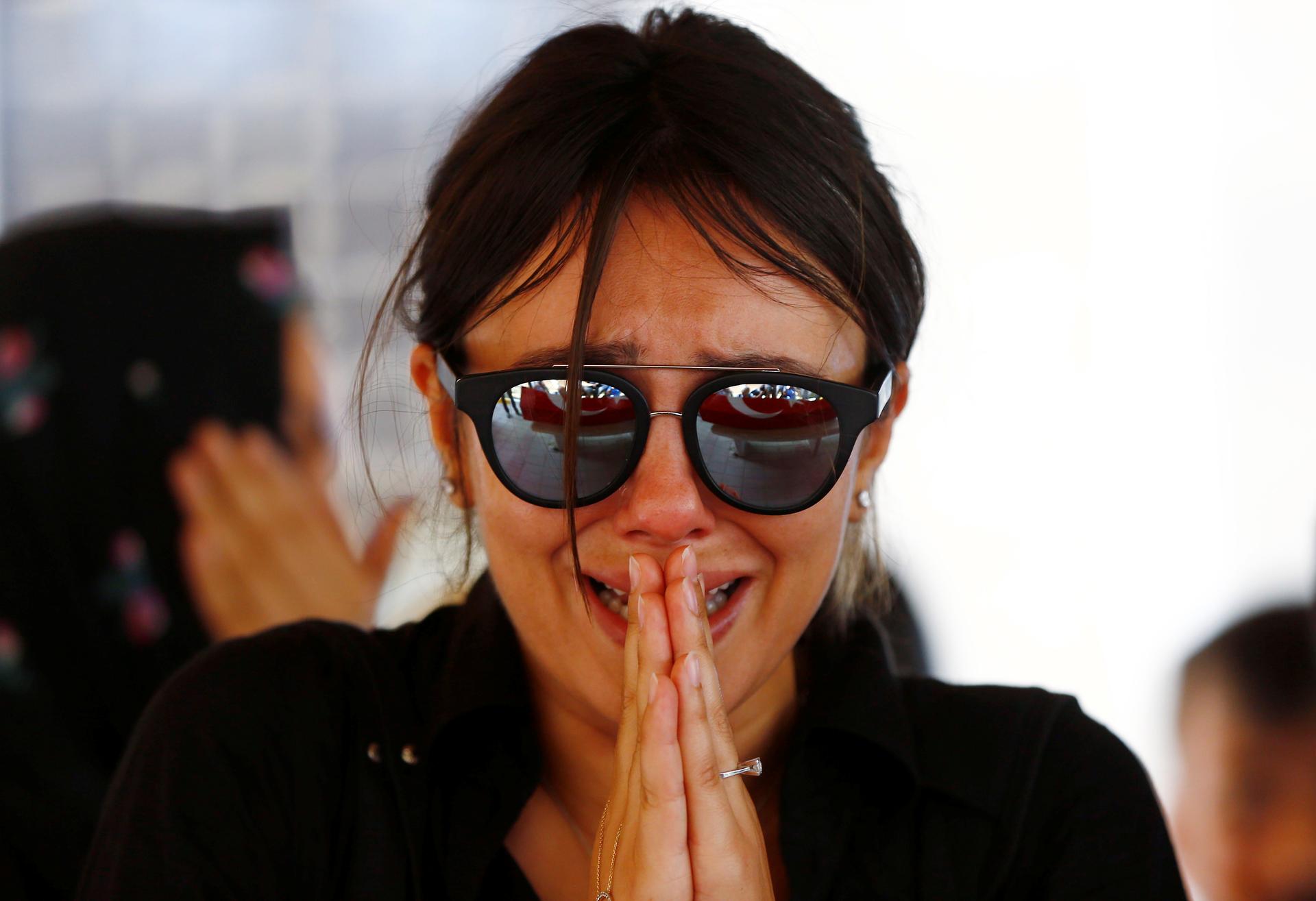A friend of Gulsen Bahadir, a victim of Tuesday's attack on Ataturk Airport, mourns during her funeral ceremony in Istanbul, Turkey, on Wednesday.
Turkey, for a long time, was a beacon of stability between Europe and the Middle East.
Now, the country is caught in a vortex of high tension and overlapping security crises.
Turkey has taken in a huge number of Syrian refugees — approximately 3 million. It’s also under severe pressure from Europe to stem the flow of migrants and jihadists, and yet more pressure from the US to battle ISIS.
Meanwhile, Turkey’s two-year-old peace agreement with Kurdish separatists collapsed last summer, and Kurdish militant groups have carried out four of eight terrorist attacks in major cities in western Turkey since July 2015. The other four are credited to ISIS, killing a total of more than 200 people in one year.
So far, no one has claimed responsibility for Tuesday’s attack at Ataturk International Airport in Istanbul, which killed at least 42 people, but Turkish Prime Minister Binali Yildirim said signs are pointing to ISIS.
But why is ISIS targeting Turkey, a Muslim country? Even more interesting is ISIS' reluctance to claim attacks carried out against Turkey — they nearly never do — compared to attacks they conduct elsewhere.
Ömer Taşpınar, a senior fellow and Turkey expert at the Brookings Institution, a research center in Washington, DC, says Turkey's pro-Western attitude and its cooperation in counterterrorism strategies with the US against ISIS are a major reason for why Turkey is an ISIS target. "Most of the American airplanes bombing ISIS are flying from military bases in Turkey," Taşpınar says.
However, Turkey remains a largely Muslim country. According to Taşpınar, this is reason enough for the militant group to avoid making a show of its enmity with Turkey, hence the group's reluctance to claim responsibility for suspected attacks in the country.
Critics accuse the national establishment under President Recep Tayyip Erdoğan of having long turned a blind eye to the threat of ISIS, instead choosing to paint Kurdish militancy as the existential threat to Turkey.
And experts blame Erdoğan for Turkey's inability to make peace with the groups like the Kurdish Workers' Party, or PKK, that Turkey and its allies consider terrorist organizations.
"He has been playing a very populist and nationalist game in Turkey," Taşpınar says. "He is, in my opinion, the main reason why the talks between the PKK and the Turkish government have collapsed. Many people in Turkey — mostly progressives and seculars — are angry with him for inflaming the war with the Kurds and playing the national security card to consolidate his power."
Erdoğan's critics say he's trying to transform the Turkish government from a parliamentary to a presidential system, in order to drive the country toward one-man rule.
Turkey has recently joined US-led coalition airstrikes against ISIS. But Western countries have long accused the NATO member of dragging its feet in cooperating in the fight.
"Here is the dilemma: The Kurds of Syria are the best allies of the United States in the fight against ISIS. They are the ground forces that the West desperately needs. The problem for Turkey is that this Kurdish group in northern Syria is the sister organization of the PKK, in fact they are essentially the same thing. So in the eyes of Turkey, the US is helping a terrorist organization to fight another terrorist organization," Taşpınar says.
"Turkey doesn't want the US to rely on its enemy, and the US is unable to find an alternative since no other force is willing to fight ISIS like the Kurds are."
But Erdoğan is going to have to start caring about ISIS now. Tourism in Turkey is practically dead because of these attacks and the economy is hurting.
Read more: Turkey's tourism is only going downhill from here
"The more you fight ISIS, the higher the risk of retaliation, because Turkey is right at the border," Taşpınar says. "Turkey is not Belgium, it's not France. It doesn't have a huge buffer with Syria."
"The situation in Syria is proving to be increasingly difficult for Turkey to handle," Taşpınar says. "Both on the Kurdish front and the Syrian front I see dynamics deteriorating in the short run. In the longer run, however, the only solution to this mess will be a peaceful transition somehow in Syria to a new regime, and also a peace agreement between the PKK and Turkey."
Every day, reporters and producers at The World are hard at work bringing you human-centered news from across the globe. But we can’t do it without you. We need your support to ensure we can continue this work for another year.
Make a gift today, and you’ll help us unlock a matching gift of $67,000!
